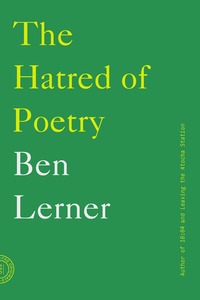You need to sign in or sign up before continuing.
Take a photo of a barcode or cover
If my seatmate in a holding pattern over Denver calls on me to sing, demands a poem from me that will unite coach and first class in one community, I can’t do it. Maybe this is because I don’t know how to sing or because the passengers don’t know how to listen, but it might also be because “poetry” denotes an impossible demand.
Generally, no one enjoys a poet sulking in prose. Lerner argues everyone has a contempt for poetry because no poet could ever possibly bridge the chasm between the written poem and the ideal poem.--yet, like fools, they keep trying. No poet can ever write the perfect poem. Then again, no sculptor has ever carved the perfect piece, no painter the perfect painting, no musician the perfect song. But Lerner only hates on poetry (see his title).
I remember a piece in a university paper where the author opened with a description of having sex on his bed and, when sitting up, finding a copy of Camus stuck to his sweaty buttock. The article then continued on about how everyone is a stranger and no amount of anything could ever bridge the gulf. In the end, I decided the point the author wanted to make was that he had had sex and read Camus.
Lerner wants the audience to know he is a “published” poet. It's important to him, since being a "published" poet provides street cred. He wants the audience to know he is very intelligent—and we couldn’t say he isn’t; in fact, he’s a pedant willing to rip a poorly written poem to shreds to prove how well he understands meter. But there’s an awful lot of sleight of hand here, where the citations he uses do not support his conclusions. Lerner quotes someone who doesn’t mention Walt Whitman, but Lerner goes off on Whitman for a dozen or so pages, concluding the original source mistakenly believed this about Whitman when, if we read the source carefully, he never mentioned Whitman in the first place. Lerner wanted to convey what he knew about Whitman. The context of the other critic is a nebulous framing device. At other times someone will discuss “art” but Lerner replaces the term with “poetry.” We are not to notice the implications of the substitution.
Using Lerner’s logic, if poetry is contemptible, then poetry criticism should be despised. This little treatise resembles the work of a sullen teenager: “Dear Reader—I’m a published poet and I know what a virgule is and I have interesting ideas.” No, Lerner, you don’t. There’s moments of clarity, moments of great writing, but the overall piece is unsatisfying. You can’t take on poetry and assume because people in airports do not understand it and that you have the critical tools to dismantle any poem purported to be “good” we must, therefore, hate it with you. I’ll finish with Kurt Vonnegut, from Palm Sunday:
As for literary criticism in general: I have long felt that any reviewer who expresses rage and loathing for a novel or a play or a poem is preposterous. He or she is like a person who has put on full armor and attacked a hot fudge sundae or a banana split.
Generally, no one enjoys a poet sulking in prose. Lerner argues everyone has a contempt for poetry because no poet could ever possibly bridge the chasm between the written poem and the ideal poem.--yet, like fools, they keep trying. No poet can ever write the perfect poem. Then again, no sculptor has ever carved the perfect piece, no painter the perfect painting, no musician the perfect song. But Lerner only hates on poetry (see his title).
I remember a piece in a university paper where the author opened with a description of having sex on his bed and, when sitting up, finding a copy of Camus stuck to his sweaty buttock. The article then continued on about how everyone is a stranger and no amount of anything could ever bridge the gulf. In the end, I decided the point the author wanted to make was that he had had sex and read Camus.
Lerner wants the audience to know he is a “published” poet. It's important to him, since being a "published" poet provides street cred. He wants the audience to know he is very intelligent—and we couldn’t say he isn’t; in fact, he’s a pedant willing to rip a poorly written poem to shreds to prove how well he understands meter. But there’s an awful lot of sleight of hand here, where the citations he uses do not support his conclusions. Lerner quotes someone who doesn’t mention Walt Whitman, but Lerner goes off on Whitman for a dozen or so pages, concluding the original source mistakenly believed this about Whitman when, if we read the source carefully, he never mentioned Whitman in the first place. Lerner wanted to convey what he knew about Whitman. The context of the other critic is a nebulous framing device. At other times someone will discuss “art” but Lerner replaces the term with “poetry.” We are not to notice the implications of the substitution.
Using Lerner’s logic, if poetry is contemptible, then poetry criticism should be despised. This little treatise resembles the work of a sullen teenager: “Dear Reader—I’m a published poet and I know what a virgule is and I have interesting ideas.” No, Lerner, you don’t. There’s moments of clarity, moments of great writing, but the overall piece is unsatisfying. You can’t take on poetry and assume because people in airports do not understand it and that you have the critical tools to dismantle any poem purported to be “good” we must, therefore, hate it with you. I’ll finish with Kurt Vonnegut, from Palm Sunday:
As for literary criticism in general: I have long felt that any reviewer who expresses rage and loathing for a novel or a play or a poem is preposterous. He or she is like a person who has put on full armor and attacked a hot fudge sundae or a banana split.
It's so hard to rate things sometimes. Did I love it? Did it feel personal to me enough to warrant a higher rating? No. But I'm glad to have read it. Although meandering and hard to follow at times, it was short and well explained.
O texto em si é meio confuso, mas as páginas finais da conclusão são excelentes.
A short essay defending Poetry in spite of the hatred it receives from both poets and non-poets. Lerner defends the art form as an exercise of the impossible. Poetry is hated because it doesn't achieve its impossible task of moving the individual into a collective and back again. For Lerner, individual poems do not reach the heights of Poetry.
Lerner hopes critics will allow poetry to attempt to create a space of possibility, even if it.means to be contemptuous if the form. A thoughtful commentary that can be read in one sitting, and should be on everyone's bookshelf.
Lerner hopes critics will allow poetry to attempt to create a space of possibility, even if it.means to be contemptuous if the form. A thoughtful commentary that can be read in one sitting, and should be on everyone's bookshelf.
5+ out of 5.
There is an inherent recognition in Lerner’s essay that the oft-repeated maxim of poetry being evident in every human mind is true. Yes, I would agree with him that it doesn’t make sense: every other art form requires some element of practice and natural talent. But poetry is itself an attempt, more than anything else, to express the inexpressible about being human – and so it may manifest itself as a moment when you’re stopped still by light dappling through trees across a fire escape out an apartment window with conversation from the neighboring restaurant drifting through the breeze and an acoustic guitar strumming quietly through the closed door at the other end of the apartment. Or perhaps it manifests as the slight dizziness at the news of another shooting, another life or lives stopped short because a policeman or an extremist couldn’t stop themselves short, and the way that the muscles around your heart constrict and your palms get sweaty and the tears don’t quite make it into your eyes even though they did the last time but maybe the last time was already one time too many. You may not be able to express how these moments or any moments strike you, or you may choose to express them in means other than the poetic. But the experience of them is Poetry – and we hate poetry because it will never quite express the inexpressible.
More at RB: https://ragingbiblioholism.com/2016/06/15/the-hatred-of-poetry/
There is an inherent recognition in Lerner’s essay that the oft-repeated maxim of poetry being evident in every human mind is true. Yes, I would agree with him that it doesn’t make sense: every other art form requires some element of practice and natural talent. But poetry is itself an attempt, more than anything else, to express the inexpressible about being human – and so it may manifest itself as a moment when you’re stopped still by light dappling through trees across a fire escape out an apartment window with conversation from the neighboring restaurant drifting through the breeze and an acoustic guitar strumming quietly through the closed door at the other end of the apartment. Or perhaps it manifests as the slight dizziness at the news of another shooting, another life or lives stopped short because a policeman or an extremist couldn’t stop themselves short, and the way that the muscles around your heart constrict and your palms get sweaty and the tears don’t quite make it into your eyes even though they did the last time but maybe the last time was already one time too many. You may not be able to express how these moments or any moments strike you, or you may choose to express them in means other than the poetic. But the experience of them is Poetry – and we hate poetry because it will never quite express the inexpressible.
More at RB: https://ragingbiblioholism.com/2016/06/15/the-hatred-of-poetry/
challenging
informative
reflective
slow-paced
challenging
reflective
slow-paced
Swift and intermittently useful meditation on poetry. Best, probably, when engaging with Edmundson and Rankine, thinking through “universality” and how fraught it is. But also a nice oscillating appreciation of poetry in general with all its faults.
I picked this up from the local library. I ordered a copy off Amazon before I even finished it. I liked it that much. It's probably not for everyone, but it probably is too.
I really enjoy his casual, honest and sly tone. I'll definitely be picking up one of his novels.



